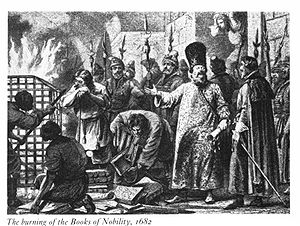- Mestnichestvo
-
 Burning pedigree books in 1682.
Burning pedigree books in 1682.
In Russian history, Mestnichestvo (Russian: Ме́стничество, IPA: [ˈmʲestnʲɪt͡ɕɪstvə]; from ме́сто) was a feudal hierarchical system in Russia from the 15th to 17th centuries. Mestnichestvo revolved around a simple principle: the boyar who estimated that his origins were more ancient and his personal services to the tsar more valuable could claim a higher state post. This often led to disputes among nobles about their ancestry and their services to the monarch.
Because of the mestnichestvo, otherwise qualified people who could not boast of sufficiently extended ancestry had no hope of getting an important state post. Additionally, a boyar from an old and respected family could get an important promotion even if personally unqualified.
With the developing autocracy, where the core principle was the creation of a central bureaucracy reporting directly to the tsar, the role of the mestnichestvo was progressively reduced. Moreover, increasing defense needs required that the top military posts be occupied by capable officers, not ancestry-proud but inept boyars. Consequently, the mestnichestvo was abolished in 1682 by Feodor III of Russia. The abolition made it easier later for Peter the Great to reform and govern the state. However, one can not neglect the positive effects as ensuring elite loyalty and thus political cohesion and stability, Also, the state may have had more flexibility in appointments than critics of the system have suggested. Tsars were able to make appointments outside the mestnichestvo system which created positions as bez mest, or "without place".
References
Categories:- Kinship and descent
- Politics of Muscovy
- 1682 disestablishments
- Russian words and phrases
Wikimedia Foundation. 2010.
